Pearson biology chapter 3 - Study guides, Class notes & Summaries
Looking for the best study guides, study notes and summaries about Pearson biology chapter 3? On this page you'll find 26 study documents about Pearson biology chapter 3.
Page 2 out of 26 results
Sort by
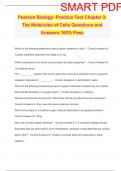
-
Pearson Biology- Practice Test Chapter 3: The Molecules of Cells Questions and Answers 100% Pass
- Exam (elaborations) • 3 pages • 2024
-
- $10.49
- + learn more
Pearson Biology- Practice Test Chapter 3: The Molecules of Cells Questions and Answers 100% Pass Which of the following statements about carbon skeletons is true? - Correct Answer️️ - -Carbon skeletons may take the shape of a ring. Which component of an amino acid provides its acidic properties? - Correct Answer️️ - -its carboxyl group The __________ reaction that occurs when two monomers combine to form a polymer releases molecules of __________. - Correct Answer️️ --dehydra...
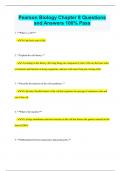
-
Pearson Biology Chapter 8 Questions and Answers 100% Pass
- Exam (elaborations) • 7 pages • 2024
-
- $9.98
- + learn more
Pearson Biology Chapter 8 Questions and Answers 100% Pass 1. **What is a cell?** - It's the basic unit of life. 2. **Explain the cell theory.** - According to this theory, all living things are composed of cells. Cells are the basic units of structure and function in living organisms, and new cells arise from pre-existing cells. 3. **Describe the function of the cell membrane.** - It's the thin, flexible barrier of the cell that regulates the passage of substances into and out of t...
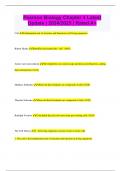
-
Pearson Biology Chapter 4 Latest Update | 2024/2025 | Rated A+
- Exam (elaborations) • 7 pages • 2024
-
- $9.78
- + learn more
Pearson Biology Chapter 4 Latest Update | 2024/2025 | Rated A+ Cell Fundamental unit of structure and function in all living organisms Robert Hooke Identified and named the "cell" (1665) Anton van Leeuwenhoek Developed his own microscope and discovered bacteria, calling them animalcules (1674) Matthias Schleiden Observed that all plants are composed of cells (1838) Theodor Schwann Observed that all animals are composed of cells (1839) Rudolph Virchow Concluded that all cells arise from...

-
Test-Bank - Campbell Biology in Focus, 11th AP® Edition (Urry, 2017) Chapter 1-43 | All Chapters 2023
- Exam (elaborations) • 1244 pages • 2023
- Available in package deal
-
- $12.99
- + learn more
Test-Bank - Campbell Biology in Focus, 11th AP® Edition (Urry, 2017) Chapter 1-43 | All Chapters 2023 Test Bank Campbell Biology, 11e (Urry) Chapter 1 Evolution, the Themes of Biology, and Scientific Inquiry 1.1 Multiple-Choice Questions 1) Cells are . A) only found in pairs, because single cells cannot exist independently B) limited in size to 200 and 500 micrometers in diameter C) characteristic of eukaryotic but not prokaryotic organisms D) characteristic of prokaryotic and eukaryo...
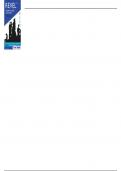
-
Test Bank For Journey of Adulthood 8th Edition By Bjorklund
- Exam (elaborations) • 222 pages • 2023
-
Available in package deal
-
- $31.97
- + learn more
CHAPTER 1 INTRODUCTION TO ADULT DEVELOPMENT CHAPTER OUTLINE • Basic Concepts in Adult Development • Sources of Change o NormativeAge-GradedInfluences o Biology 0 Biological Clock o SharedExperiences 0 Social Clock 0 Ageism o InternalChangeProcesses o NormativeHistory-GradedInfluences 0 Culture o NonnormativeLifeEvents • Sources of Stability o Genetics 0 Behavior Genetics 0 Twin Studies o Environment o InteractionistView 0 Epigenetic inheritance • A Word about “A...
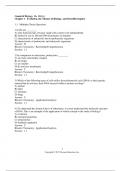
-
Test Bank Campbell Biology, 11th edition by Urry Cain
- Exam (elaborations) • 1242 pages • 2023
-
- $12.99
- + learn more
Campbell Biology, 11e (Urry) Chapter 1 Evolution, the Themes of Biology, and Scientific Inquiry 1.1 Multiple-Choice Questions 1) Cells are ________. A) only found in pairs, because single cells cannot exist independently B) limited in size to 200 and 500 micrometers in diameter C) characteristic of eukaryotic but not prokaryotic organisms D) characteristic of prokaryotic and eukaryotic organisms Answer: D Bloom's Taxonomy: Knowledge/Comprehension Section: 1.1 2) In comparison to euka...
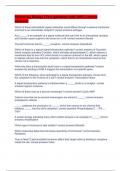
-
Mastering Biology-Exam (A GRADED) Combined questions with 100% correct answers
- Package deal • 8 items • 2023
-
- $43.49
- + learn more
Mastering Biology (Test questions with 100% correct answers) Chapter 1-3 Mastering Biology (Practice questions with 100% correct answers) Mastering Biology CH. 3&4 (Pearson) All possible questions with complete answers)
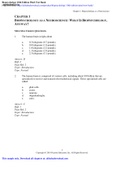
-
Biopsychology 10th edition pinel test bank complete all chapters a guide
- Exam (elaborations) • 51 pages • 2023
-
- $18.49
- + learn more
Biopsychology 10th edition pinel test bank complete all chapters a guideCHAPTER 1 BIOPSYCHOLOGY AS A NEUROSCIENCE: WHAT IS BIOPSYCHOLOGY, ANYWAY? MULTIPLE CHOICE QUESTIONS 1. The human brain weighs about a. 0.3 kilograms (0.7 pounds). b. 0.8 kilograms (1.8 pounds). c. 1.0 kilograms (2.2 pounds). d. 1.3 kilograms (2.9 pounds). e. 2.3 kilograms (5.1 pounds). Answer: D Diff: 2 Page Ref: 2 Topic: Introduction Type: Factual 2. The human brain is composed of various cells, including abo...
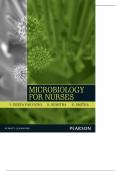
-
Microbiology for Nurses by V. Deepa Parvathi, R. Sumitha, S. Smitha.
- Exam (elaborations) • 445 pages • 2024
-
- $22.89
- + learn more
Microbiology for Nurses by V. Deepa Parvathi, R. Sumitha, S. Smitha. Microbiology for Nurses V.Deepa Parvathi Department of Human Genetics College of Biomedical Sciences, Technology and Research Sri Ramachandra University Porur, Chennai Tamil Nadu R. Sumitha Department of Biomedical Sciences College of Biomedical Sciences, Technology and Research Sri Ramachandra University Porur, Chennai Tamil Nadu S. Smitha C M Manguli Degree College Sindagi, Bijapur Karnatak...
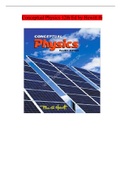
-
Conceptual Physics 12th Ed by Hewitt TestBank Completed Correctly
- Exam (elaborations) • 398 pages • 2022
-
- $25.50
- + learn more
Conceptual Physics 12th Ed by Hewitt TestBank Completed Correctly Conceptual Physics 12th Ed by Hewitt tb1 Copyright © 2015 Pearson Education, Inc. Conceptual Physics, 12e (Hewitt) Chapter 1 About Science 1.1 Multiple-Choice Questions 1) Science is a body of knowledge that A) describes order in nature. B) is an ongoing human activity. C) condenses knowledge into testable laws. D) all of the above E) none of the above Answer: D Diff: 1 Topic: Scientific Measurements 2) To a fair...

That summary you just bought made someone very happy. Also get paid weekly? Sell your study resources on Stuvia! Discover all about earning on Stuvia


